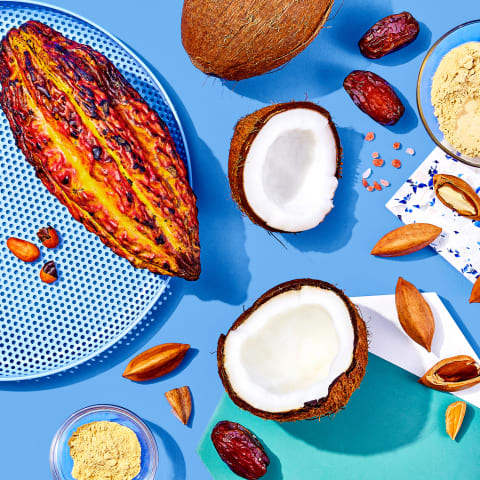Advertisement
4 Ways To Choose A Nondairy Milk & The New Variety We Can't Get Enough Of

Nondairy milks have been top of mind (and coffee cups and cereal bowls) for some time now, but we haven't paid them the proper attention when it comes to the specifics of our selections. All too often, they're filled with unrecognizable ingredients you wouldn't find in your pantry—a classic case of "simple" products gone awry.
With so many varieties, blends, and not-so-pure formulations hiding in plain sight, awareness is key when choosing your go-to(s). Luckily, we're here to help you navigate the refrigerated section to find the milk that works for you with a few must-know tips. First things first:
Flip it over: Your approach to a nondairy milk purchase shouldn't be any different from your approach to your other packaged goods and produce: Flip it over. Nutrition facts are there for a reason; they provide you with the information you need to support your body inside out! Take note of ingredients you don't recognize, added sugars, and other info that may not be aligned with your personal approach to nutrition and well-being goals.
We know sometimes it's easier to turn a blind eye, but don't be afraid to examine what you've been using! If your favorite nut-based milk is loaded with ingredients you can't pronounce, perhaps it's time to consider a less-processed option. There are so many unique flavors and brands out there that have only what you need (and want) in a nondairy milk.
Watch out for thickeners and additives: Have you ever wondered why some of your nondairy milks are inexplicably creamier or thicker? It could be that there are some extra agents helping...and you may not want to be sipping them. Three examples? Grapeseed oil, guar gum, and gellan gum. These ingredients aren't necessarily "bad," but they're known to cause inflammation and digestive issues. If you're looking to adopt a minimally processed and functionally nourishing lifestyle, you'll want to avoid these extra ingredients.

Know your milk's base: They're not all the same! So how about a taste test? From macadamia to almond, cashew to our new favorite pili, they all offer a little something different, from flavor to nutrition profile. Almond and cashew milks both have calcium and vitamins D and E, but cashew doesn't have the protein content almond does. Macadamia nut milk has vitamin B-12 but is low in calcium. Do some experimenting and find one that suits your palate and supports your health goals.
The simpler, the better: When it comes to the ingredients in your dairy-free milk, the simpler, the better. Functional nutrition is all about taking inventory of what you're consuming and how it's nourishing your body holistically. If an ingredient isn't serving you, you simply don't need it! When the choice is between a superfood, like the pili nut, and an ingredient you couldn't pick out of a lineup, the decision is clear.
Next time you're picking out a nondairy milk, shop with a little more intention, and don't be afraid to try something new. Maybe a pili nut milk turmeric latte is exactly what the doctor ordered this season.

Why Nutrition Is Key To Changing Your Relationship With Alcohol
Brooke Scheller, DCN, CNS

Why Alcohol Sabotages Your Gut Health & How To Get Back On Track
Brooke Scheller, DCN, CNS

Why Nutrition Is Key To Changing Your Relationship With Alcohol
Brooke Scheller, DCN, CNS

Why Alcohol Sabotages Your Gut Health & How To Get Back On Track
Brooke Scheller, DCN, CNS

Why Nutrition Is Key To Changing Your Relationship With Alcohol
Brooke Scheller, DCN, CNS

Why Alcohol Sabotages Your Gut Health & How To Get Back On Track
Brooke Scheller, DCN, CNS

Why Nutrition Is Key To Changing Your Relationship With Alcohol
Brooke Scheller, DCN, CNS

Why Alcohol Sabotages Your Gut Health & How To Get Back On Track
Brooke Scheller, DCN, CNS















